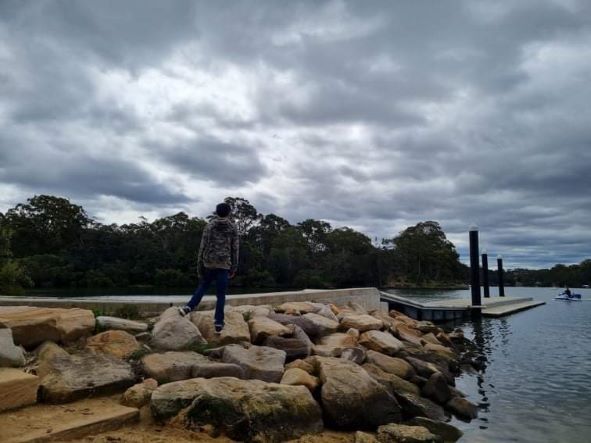Many people express that they feel like the odd one out in any given situation. They feel isolated, misunderstood and different wherever they go. These people go through life like the boy in the bubble from Seinfeld, separated from true connection by an invisible shield that prevents intimacy. The reasons for this isolation are many and varied. Some key triggers include mental health issues such as anxiety and depression, unusual tastes, different cultural backgrounds,other diagnoses such as Autism or even intelligence and education. Some people even feel isolated simply because they do. It is understandable why many of us retreat to our metaphorical bubbles sometimes. They protect us from hurt, they make us less vulnerable in the moment and they keep our most precious feelings safe. The problem is that in the long term, the damage done from too much isolation is far greater than the risk of vulnerability and connectedness. We need to find a balance.
Those triggers
We all have triggers that cause us to want to flee on occasion. Mine include being harshly criticised, failure, rejection and being let down. When one of these things happens, it is almost like a direct hit to my soul. If the trigger is caused by someone that really matters to me, it can even lead to depression. No wonder I feel like isolating myself and hiding from the consequences. No wonder so many of us put up our force fields to keep the danger away. Whenever these feelings occur, you need to make yourself aware of what caused them.
Thankfully, knowing about your triggers is an important key step to avoiding the negative spiral of self condemnation and building resilience instead. When I am criticised about one simple thing, I now know that I am vulnerable to the temptation of catastrophizing every other aspect of my life as well. The phrase that comes to mind is ‘Throwing the baby out with the bath water’.
Alternative approaches
The one great thing about isolating yourself, is that it has an immediate effect. It takes you out of harm’s way. The problem though, is that even though it may feel like it, the issue doesn’t go away. You will have to deal with it again someday. It is much better to face the issue with courage than to avoid it all together. Too much isolation is a dangerous mirage.
Some key alternate approaches include keeping a gratitude journal and re-reading it during negative moments. Reminding yourself that your motives are altruistic helps, as does reminding yourself of past victories and success. Spending time with one or two trustworthy friends also helps. They remind us that we are valued and they help take our mind off ourselves. Another healthy approach is doing something nice for someone in need. This helps you to remember that you are a good person. Even going for a nice walk helps to clear your mind. Any of these approaches has the desired effect of stopping the downward spiral of rumination and self reprisal that we all engage in sometimes.
Cognitive Behaviour Therapy (CBT) is a proven therapy to help you train your mind to avoid negative pitfalls. If you do find yourself isolated, you could do far worse and little better than reading about it. It is practical and offers simple exercises to keep your mind on the straight and narrow. The book below helped me greatly. This is not a link that I receive funds from.
Change Your Thinking [Third Edition] : Edelman, Sarah: Amazon.com.au: Books
When alone time is necessary
Sometimes alone time is necessary, especially if you are more of an introvert. That time away can recharge you and refresh you for the battle ahead. That said, it is better by far for you to follow a structure during these moments away from others, than to simply mope and stare at your shoes. Isolation can take over if you are not careful. Plan to do something for yourself in these alone times, if for no other reason than it reminds you that you are valuable. Read, cook, play or listen to music, write, create or even go for a drive. Whatever gets you into the flow.
What not to do
Whatever you do when you are alone, don’t do anything drastic like quit your job or move away. These big decisions are best kept for when you are on an even keel. At the other end of the scale, having a snooze can help, but always set an alarm. There is very little worse for your mental health than throwing your sleep patterns out.
Excessive alcohol and unprescribed drugs are always a big no. It is far too easy to medicate away your pain in the short term, only to have it return much stronger and more vicious the next day. Drinking to escape pain and loneliness is dangerous and unhealthy. Trust me on this. Now while we are on the issue of self-medication, let me remind you to keep an eye on the less obvious things, like overeating, impulse shopping and all night binges. Don’t do anything to extremes.
Know yourself – have a plan
When something or someone hurts you and you want to get away, the best thing to know is what makes you tick. Know what triggers you and know what cheers you up. Know also where the best place for you to be is. Whether it is safe at home, visiting mum and dad, with a friend or camping by a picturesque river, it doesn’t matter, as long as it is a place of healing.
Having a plan for alone time can turn a potentially damaging time into a special time to recharge your emotional batteries. Set time aside to look after yourself, but also set an alarm to remind yourself to re-engage with society. If you find that you can’t stop isolation, then it might be time to see your Doctor for a chat.


Nice words Buddy. It can be easy to hide away. As you say it is better to have tools & plans to avoid staring at your shoes 🙂 I like a coffee & walk 🙂